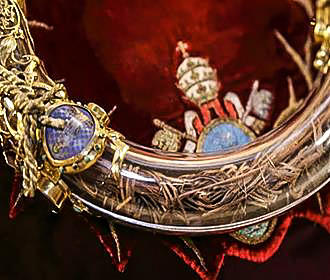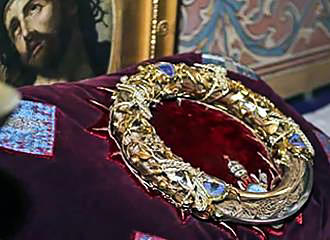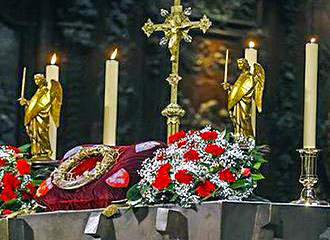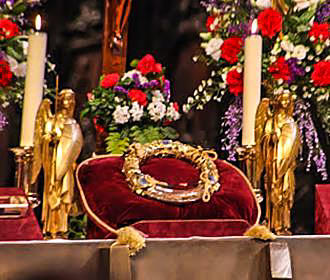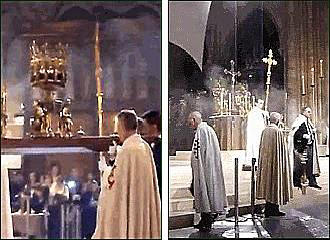Holy Crown of Thorns at Notre Dame Cathedral Paris
The relics of the Passion presented at Notre Dame de Paris include a piece of the Cross along with the Holy Crown of Thorns, and of all the relics at the Notre Dame Cathedral, the Crown of Thorns is without a doubt the most precious and the most revered.
The Crown of Thorns has been the object of Christian prayer for more than sixteen centuries, and yet, even though there have been numerous studies along with historical and scientific research on this famous relic, the authenticity of it still cannot truly be certified.
You will find The Crown of Thorns has been housed at the Paris Notre Dame Cathedral, and this is a circle of canes that are braided and held together by gold threads and the thorns were then attached to the braided circle, that measures 21cm in diameter.
However, over the years, the Byzantine Emperors and the Kings of France divided up the thorns over the centuries, and yet, there are still 70 of these thorns that are all the same type and have been confirmed as original.
How the Crown of Thorns came to Paris Notre Dame Cathedral
Accounts of The Crown of Thorns date back to the 4th century and in 409 Saint Paulinus mentions a relic that matches this, which was kept in a basilica in Jerusalem, then in 570 it is documented that the Crown of Thorns was exhibited for veneration at another basilica and so on.
Over the years many relics including the Crown of Thorns were moved to the Byzantine Emperors chapel during the 7th 8th 9th and 10th centuries, and this chapel was located in Constantinople, which is the city now known as Istanbul, and the main reason for moving the relics was to keep them safe from pillaging.
The Latin Emperor called Baldwin II, was in great financial difficulties and he pawned the Crown of Thorns along with other relics to a Venetian Merchant Bank in 1238 so that he could obtain credit, and then Saint Louis, who was King Louis IX of France took over the relics and paid back the Venetians.
King Louis IX welcomed 29 relics in Villeneuve-l’Archeveque in the Burgundy region of France on the 10th of August 1239 and then the procession along with the king continued on towards their final destination of Paris. After a few days, the relics arrived in Paris on 19th August 1239 and then King Louis took off his royal attire and wearing only a simple tunic with bare feet, he continued on to the Paris Notre Dame Cathedral accompanied by his brother and the rest of the procession also taking the Crown of Thorns with them, and Saint Louis had a reliquary, which is also known as a shrine constructed for the Crown of Thorns.
These relics were held at the Paris Notre Dame cathedral for a short time whilst the Sainte Chapelle chapel was being finished and so, from the Notre Dame Cathedral, the relics were then placed within the Sainte Chapelle Chapel, which was kings chapel at the first royal palace in Paris on the Ile de la Cite island, which is now known as La Conciergerie.
However, during the French Revolution, the relics were storied within the National Library for safe keeping. After the French Revolution, there was an agreement reached between Napoleon Bonaparte I and papal and clerical representatives in Rome and Paris that defined the status of the Roman Catholic Church in France, which is known as the Concordat of 1801, and this was then formally put into action during the Easter of 1802.
Napoleon I offered a reliquary, which is basically a shrine for The Crown of Thorns and the relics were then eventually given back to the Archbishop of Paris, who placed them within the Treasury of the Paris Notre Dame Cathedral on 10th August 1806, which is where they still remained until very recently.
Unfortunately, on the evening of 15th April 2019 a fire broke out and devastated much of the Notre Dame Cathedral including the historical spire and the roof, but you will no doubt be pleased to know that many of the treasures including the Crown of Thorns were retrieved from the building during the blaze and taken to the Paris City Hall for safe keeping, which is where they are remaining at present, although they are likely to be going to The Louvre Museum until such a time when they can be returned to the cathedral.
Unfortunately, on the evening of 15th April 2019 a fire broke out and devastated much of the Notre Crown of Thorns and Religious Relics today
Other reliquaries have been produced like the ones offered by Napoleon Bonaparte I and Napoleon III and these were also on display at the Paris Notre Dame Cathedral along with other relics within the Treasury.
However, the current shrine was designed by Eugene-Emmanuel Viollet-le-Duc, who was an architect and restorer of Medieval and Gothic buildings that worked on the restoration of the Paris Notre Dame Cathedral. And in fact, you can even get to see one of his drawings for the design of Notre Dame at the Musee d’Orsay, which is another famous Paris museum located along the banks of the River Seine near to the Ile de la Cite.
Ever since the relics have been within the Notre Dame Cathedral they have been conserved by the Canons of the Metropolitan Basilica Chapter who are in charge of venerations, and they are guarded by the Knights of the Order of the Holy Sepulchre of Jerusalem.
Also, these relics are presented to believers for veneration on the first Friday of each month in addition to every Friday during Lent at 3pm, plus this service is conducted from 10am through to 5pm on Good Friday. And therefore, it is on these days that you can join in the veneration to show respect with The Crown of Thorns and other religious relics.
Yet these relics and the Crown of Thorns will not be back at Notre Dame Cathedral for the foreseeable future due to having to rebuild the edifice to its former glory, so that generations to come can still admire this historical monument whether it be as a tourist or those on a religious pilgrimage.
So even though the Crown of Thorns, the tunic of Saint Louis along with many other relics, artefacts and major works have been saved from destruction, they will remain in safe keeping for the time being until a new place is decided upon, probably The Louvre, prior to the complete restoration of the Notre Dame Cathedral in Paris.
